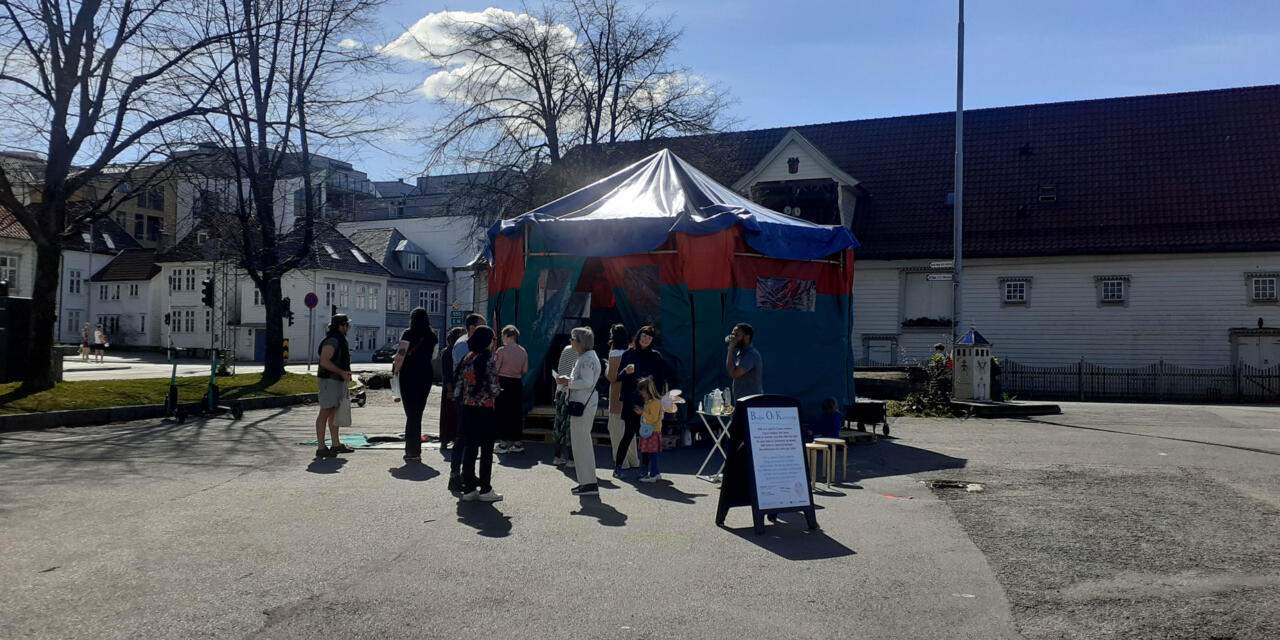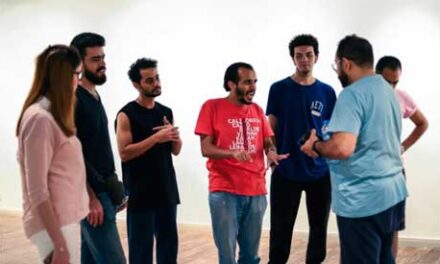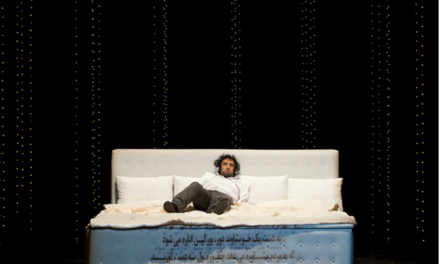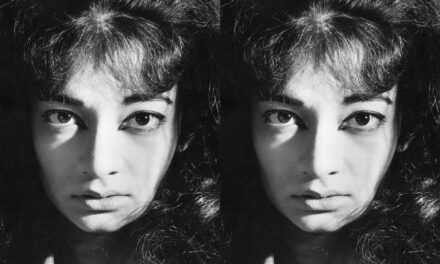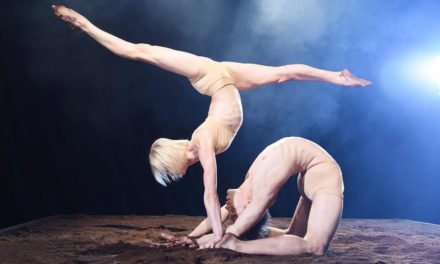Bodies of Knowledge (BOK) is a semi-nomadic classroom that facilitates alternative and non-dominant forms of learning that have the potential to lead us to a more humane and just society. Borisav Matić takes a close look at BOK events in Brussels and Bergen and talks to the artists behind this project.
The story of a semi-nomadic classroom Bodies of Knowledge (BOK) revolves around a tent. A tent is a convenient solution – it can be set up in an outdoor public space, so it is easily accessible to anyone. But, on the other hand, it is the simplest form of enclosure, so the people who gather inside are shielded from the noise, bad weather and uncomfortable staring by passers-by. And in a tent with a round shape, people can sit in a circle, so everyone feels equal. It’s not just that the BOK classroom usually takes place in a tent, but this space and the logistics that surround it also represent BOK’s philosophy.
BOK is a non-formal classroom where people can meet and learn from each other. There are no roles of teachers and students as in classical education, there is rather a safe space where people can present their experiences and transfer the types of knowledge that are marginalized in society. People whose voices are not heard in society are offered a chance to share their knowledge, and BOK is a place for listening as much as it is for talking and interaction. Even though a team of artists and cultural workers is behind the organization of every classroom, the presenters of knowledge are not professional authorities, but “life experts” who gained their skills through everyday life.
The Belgian interdisciplinary artist Sarah Vanhee initiated and conceptualized BOK in Brussels, where it took place in different neighborhoods from 2020-2021. The project was later picked up by BIT Teatergarasjen, a theatre from Bergen, Norway that organized BOK in their hometown from 23rd April to 11th June 2022. BOK is scheduled to take place in at least several more cities in Western Europe in the coming years, according to the project calendar.
How BOK Began
Sarah Vanhee created BOK as part of her doctorate on shared oral knowledge transfer at the Antwerp Research Institute for the Arts. Vanhee notes that the question “Is BOK art?” does not feel so relevant to her and that she’s doing the project as an artist because art is the only context in which she can work.
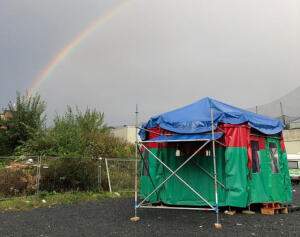
The reason why Vanhee initiated BOK is that she truly wanted to create a space where people could exchange alternative, non-dominant forms of knowledge and experience learning in a positive way. That urge partly came out of her negative experiences with formal education. In the same article, she notes how she was curious and eager to learn when she was young, but that going to school killed her thirst for knowledge.
Vanhee also says that her need to create an alternative space for learning came with the fact that she became a mother in 2015. “I suddenly realized that I would have to go again through that whole educational system that I had just happily left behind me. But I was also thinking of how I could conceive of the city not just as a place of extraction, production, reproduction, but as something that is generative in what is already there,” Vanhee says for the purpose of this article.
From Brussels to Bergen
To some extent, it was very convenient to organize BOK in Brussels because of the structure of the city. A lot of people of various backgrounds live closely together, and there is no segregation between neighborhoods like in some other cities. “We have to make it work together and there’s, for this small surface, a lot of people from very, very different backgrounds in terms of age, class, cultural background, living together. I suddenly really saw this huge treasure of knowledge but knowing that this somehow is not activated and that I as an artist may be good to create a frame for making that visible,” Vanhee says.
BOK didn’t only explore the richness of Brussels by interacting with various communities, it was also forced to transform for a period of time into BOK on Foot during the Covid-19 lockdown and take its participants on a walk through the city. At the time of the lockdown, all gatherings outside the family circle were prohibited except a gathering of up to 4 people for an outside walk. BOK organizers used this loophole in restrictions to continue with the classroom in a modified way, but they had to make sure that the presenters were very confident since the organizers were not present at the walks because of the restricted number of participants.
Adaptation to a different environment also came with BOK’s migration to Bergen in spring 2022. The transfer of the classroom came out of the collaboration between the BOK team in Brussels and BIT Teatergarasjen from Bergen, but that collaboration was made possible through the support of the Create to Connect -> Create to Impact (CtC -> CtI), a pan-European cultural project that aimed to create social impact through arts. BIT Teatergarasjen was one of the 15 project partners, while Bunker, a Slovenian non-profit cultural organization, was the leader of the project (which lasted from 2018 to August 2022). Within one of the project’s aims to support young critics and journalists, CtC -> CtI also made possible my trip to Bergen, so that I could participate in the BOK classroom before writing this article.
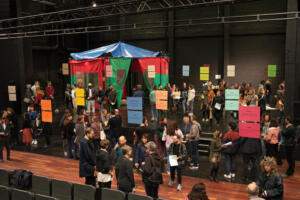
The finishing ‘Multiplication’ event at BOK in Brussels
Sarah Vanhee and Flore Herman, who was one of coordinators of BOK in Brussels, worked closely with BIT Teatergarasjen to transfer the project into another local context. They chose BIT Teatergarasjen because of their long-standing collaborations and their early involvement with BOK in Brussels. “It was the first time we passed on the tools and the frame of BOK to another team, to a different context,” Flore Herman says. “They (BIT Teatergarasjen) have really followed the creation of BOK in Brussels since the very beginning, even before the tent existed.”
Herman also says that it was very important for them at the Brussels team for BOK in Bergen to be managed by a local artistic team, someone who knows the city, has connections and knows what type of knowledge is missing in the local environment. Danja Burchard and Amelia Meyer – in coordination with others from BIT Teatergarasjen – eventually started working as an artistic team organizing the BOK in Bergen. They researched local communities, invited participants i.e. bodies of knowledge and worked with them in preparation for classrooms.
The Inside Process
Given that the aim of BOK is to discover and share knowledge that is marginalized in society, the question arises of how anyone unearths that type of knowledge. But the BOK team in Brussels developed tools to help them find bodies of knowledge, and the artistic team in Bergen continued using those tools. Despite the obvious tool of researching individuals, groups, communities and organizations, one of the most useful tools is a set of questions that organizers use while interacting with everyday people on the street.
Danja Burchard remembers how she used those questions in Bergen: “I went out to different public squares or cultural houses and engaged in conversations with people. I asked them if there is something I could learn from them if there was something they would like to learn, share, etc. In each of the conversations, I could learn something new, from the smallest thing to very surprising life stories and experiences that people shared. It was really beautiful. I tended to frame the questions in a way that hinted at the knowledge that serves a more just society – which also helped to ask for knowledge or issues that mattered to them. Something that needed to be heard.”
Flore Herman says that a lot of thought was put into developing the questions and that the questions were evolving thanks to meetings with two classes of 17 or 18-year-olds at two schools in Brussels. At some other times, conversations that the organizers had with people on the streets influenced the questions. “And maybe the last thing about the questions is that they focus more on practices or life knowledge and less on critique. So, there is the question there of how to formulate so people can actually think of their own experience and not only criticize the existing education system or economical system,” Herman says.
After the process of mapping and researching the local community, organizers move on to invite bodies to share their knowledge in the classrooms. Between the invitation and the classroom, Danja Burchard had 2 or 3 meetings with each presenter in order to find out more about the knowledge they embody and help them structure their classroom presentation. Sometimes the presenters found out that the issue they wanted to talk about is too close to their hearts or that they still haven’t overcome the traumas, so they agreed with the organizers to revisit the possibility of classroom presentations at another time. In other cases, the third meeting would serve as the last check-in before the presentation.
BOK and the Impact on Community
It seems that all topics that were discussed in classrooms were socially relevant and when we consider that all the classrooms were told from a first-person, life experience perspective, it’s hard to imagine that BOK didn’t have any impact on the community that gathered around this event. The day I attended BOK in Bergen on 21st May 2022, there were three incredibly inspiring and very well-structured sessions. The first session dealt with the presenter’s personal experience of navigating shame and body dysmorphia and the ways to overcome them. The second session was a story of navigating anger and frustration at a time when the social system fails the individual, while the third was a refugee’s story of living in Norway with no legal papers. Intentional or not from a curatorial point of view, all three presenters narrated their deep personal problems, but also the solutions that are maybe even more important to the stories.
It is hard to measure what social impact BOK had on its audience, but Danja Burchard has a few stories to share. “One person shared small exercises on regulating the nervous system. This ended up speaking to one listener, who had never before been exposed to knowledge related to e.g. breathing, yoga or bodywork, but who was struggling with health.” A few weeks later, Burchard met them in a yoga studio where they had been invited for a trial phase by another listener, having their first-ever yoga class.
Burchard remembers one more positive example: “Someone else shared about gardening projects and sustainable seed harvesting, mentioning how citizens could take up space in the city to build little gardens. This spoke to several listeners with Families without access to greenery or with a background in farming. They exchanged contacts and reached out.”
Danja Burchard concludes: “During the sessions following the questions, you could see how many people were impacted differently by being able to relate to the knowledge, learning new strategies, or simply by hearing something completely new. It felt as if every session had some impact on someone.”
This post was written by the author in their personal capacity.The opinions expressed in this article are the author’s own and do not reflect the view of The Theatre Times, their staff or collaborators.
This post was written by Borisav Matić.
The views expressed here belong to the author and do not necessarily reflect our views and opinions.

